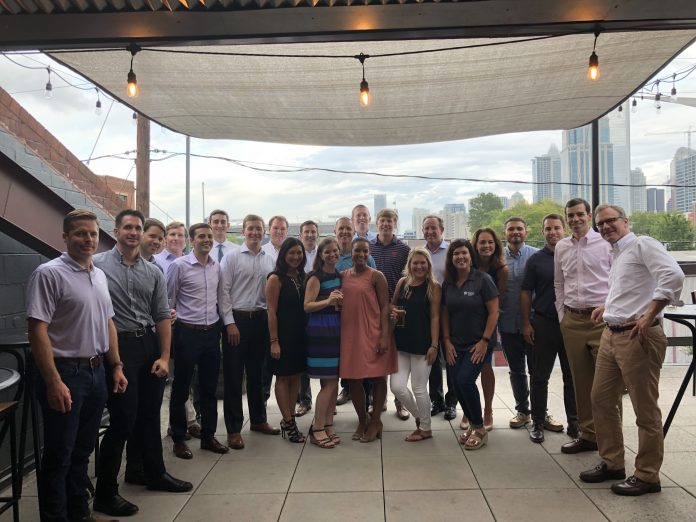Fifteen multifamily developers and partners teamed up with Habitat for Humanity Charlotte to fund and build a new home on Millhaven Lane in North Charlotte.
The building project commenced on April 25th and was completed in July. Representatives from the participating companies gathered for a social event on Aug. 20 to celebrate the completion of the project and to toast the new homeowners, the Graham Family.
The Multifamily Developers’ Build was organized by Charlotte-based developer, Crescent Communities. Brian Natwick, president of Crescent Communities’ multifamily business and former Habitat for Humanity Charlotte board chair, recruited team members and partners for the event. This is the third build of its kind for the Multifamily Developers Build, who completed similar projects with Habitat for Humanity Charlotte in 2015 and 2017.
The multifamily development and advisory companies partnering on the project include:
Alliance Residential
CBRE
Charter Properties, Inc.
Childress Klein
Crescent Communities
Greystar
HFF
JLL
Lennar Multifamily Construction (LMC)
Newmark Knight Frank
Pollack Shores
Proffitt Dixon
Terwilliger Pappas
Wood Partners
Woodfield Investments
Together these partners raised in excess of $80,000 for this Habitat for Humanity build. Most partners will participate with one full volunteer day on the project, which will conclude in June. The Crescent Communities team spent their volunteer day in April providing framing work, including raising the first wall for the home.
“The Multifamily Developers Build exemplifies a spirit of collaboration where area firms come together to serve the greater good, improving the lives of a family as well as the overall community,” says Habitat Charlotte president and CEO Laura Belcher. “It’s an opportunity for businesses that are often competitors to put down their differences, pick up their hammers, and make a real difference.”
“On behalf of the 15 partner organizations, it is honor to team up with Habitat for Humanity Charlotte for the third annual Multifamily Developer Build,” Natwick said in a statement “Building homes and communities is our profession but giving back to the community is a core value for all. We look forward to continuing this partnership and hope it will grow and expand.”
A typical Habitat for Humanity Home requires nearly 2,000 hours of volunteer time. While many hours are contributed by volunteers, the future homeowners also take part in the construction of their home. Through the “sweat-equity” required by Habitat for Humanity, homeowners will perform 300 to 400 hours of service on their home project or on other projects. Contrary to common beliefs, owners of Habitat for Humanity homes are still responsible for mortgage payments. Through a Habitat issued mortgage, they benefit from an affordable fixed rate mortgage.
The partners’ financial support and volunteering efforts will help build a home for SheKeitha, and her daughter and son. SheKeitha has put in her own sweat equity on the home, including hanging drywall and installing siding. In her own words, “if you want to become a homeowner, you work hard towards it.”
According to Belcher, “in addition to sweat equity, Habitat homeowners also undergo 32 hours of financial literacy and homeownership classroom training. This ensures they are well-prepared for the financial and maintenance requirements of owning a home.”

